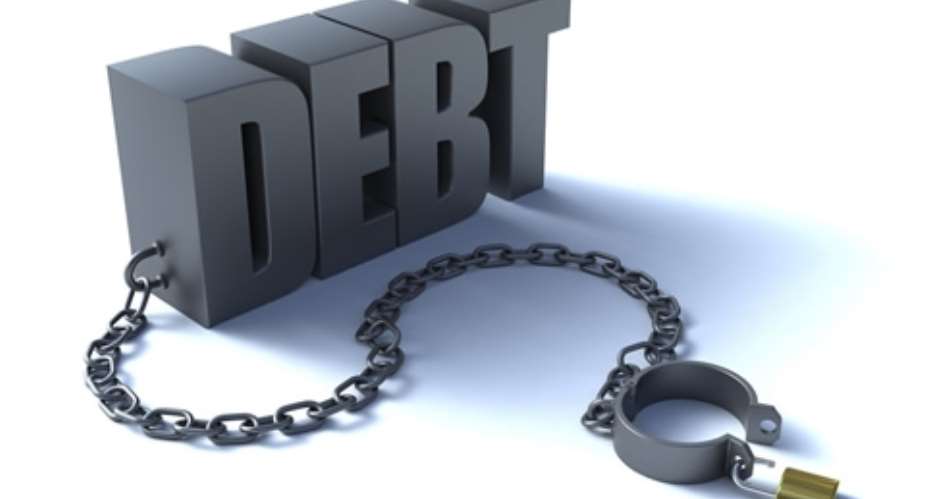The current state of Ghana's public debt, according to the latest figures from the Bank of Ghana means that every Ghanaian including new born babies, automatically owe a whopping GH¢2,700.
The total public sector debt stock as at the end of August 2014 was GH¢65.7 billion (57.3% of GDP), up from 55.5 percent of GDP (GH¢51.9 billion) as at the end of December 2013.
Ghana with an estimated population of 25 million people, when divided by the aforemntioned public debt (GH¢ 65.7 bn), means that every Ghanaian owe GH¢2,700 to the country's creditors both internally and externally as of August this year.
In 2009, every Ghanaian was indebted to the tune of GH¢380 as the total public debt stock at that time stood at GH¢9.5 billion.
This means that from 2009 up till date, an additional amount of GH¢2,320 had been added to the total debt stock owed by every Ghanaian including new born babies.
Ghana's public debt continues to rise sharply as it hit GH¢19.027 billion at the end of March 2011 compared to GH¢17.2 billion recorded in December 2010.
Some economists, including the renowned Dr. Joe Abbey has described the trend as alarming, saying it could harm the nation in the long-term since it might not have the capacity to service or pay the debt.
Over the last four years, the Danquah Institute, a policy think tank, has been vocal in raising concerns about what it considers to be a “mad rush for loans” by government, and the disturbing absence of real transparency and value-for-money component in several of these loans.
“Today, it has become evidently clear that Ghana is fast-forwarding backwards to its 2000 status of a poorly-indebted, and with very little to show for this high level of unprecedented borrowing and spending,” the Institute has stated in a statement recently.
The Institute continued: “What government is effectively doing is building a future of debts for the youth of Ghana to inherit and struggle with.”
In March this year, Fitch Ratings, an international rating agency, has revised the outlook on Ghana's long-term foreign and local currency Issuer Default Ratings (IDR) from stable to negative, casting doubts over the country's ability to service its debts in the future.
In June this year, another international rating agency, Moody's Investors Service, also downgraded Ghana's sovereign rating to B2 from B1, citing the country's rising debt burden and deteriorating debt affordability.
In its report, Moody's stated that the primary driver of its decision to downgrade Ghana's sovereign rating to B2 was the country's high and rising debt burden and deteriorating debt affordability.
The report indicated that the rating agency expected public debt to exceed 65 per cent of Gross Domestic Product (GDP) by the end of 2015 from 55.7 per cent in 2013, mirrored by rising interest expenses relative to government revenues.





 Tuesday’s downpour destroys ceiling of Circuit Court '8' in Accra
Tuesday’s downpour destroys ceiling of Circuit Court '8' in Accra
 SOEs shouldn't compromise on ethical standards, accountability – Akufo-Addo
SOEs shouldn't compromise on ethical standards, accountability – Akufo-Addo
 Father of 2-year-old boy attacked by dog appeals for financial support
Father of 2-year-old boy attacked by dog appeals for financial support
 Jubilee House National Security Operative allegedly swindles businessman over sa...
Jubilee House National Security Operative allegedly swindles businessman over sa...
 Nobody can order dumsor timetable except Energy Minister – Osafo-Maafo
Nobody can order dumsor timetable except Energy Minister – Osafo-Maafo
 Mahama wishes National Chief Imam as he clock 105 years today
Mahama wishes National Chief Imam as he clock 105 years today
 J.B.Danquah Adu’s murder trial: Case adjourned to April 29
J.B.Danquah Adu’s murder trial: Case adjourned to April 29
 High Court issues arrest warrant for former MASLOC Boss
High Court issues arrest warrant for former MASLOC Boss
 Align academic curriculum with industry needs — Stanbic Bank Ghana CEO advocates
Align academic curriculum with industry needs — Stanbic Bank Ghana CEO advocates
 Election 2024: We'll declare the results and let Ghanaians know we've won - Manh...
Election 2024: We'll declare the results and let Ghanaians know we've won - Manh...
